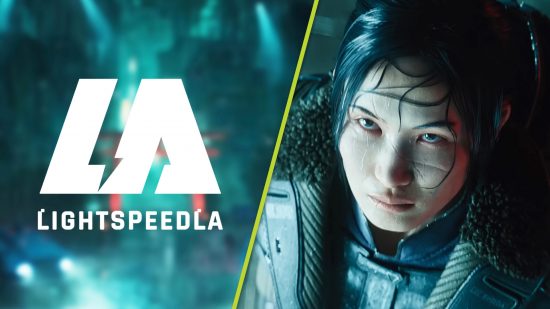It’s been a pretty glum year for videogame studios across the globe. As the post-Covid contraction has settled in, causing thousands of talented creatives to lose their livelihoods in the process, my excitement about heading over to GDC for the first time was unsurprisingly muted. However, I flew home on the Friday morning feeling a touch more hopeful for the industry’s future, and much of that is down to a series of interactions I had with the team at Lightspeed LA – the studio spearheaded by Rockstar veteran Steve Martin and the minds behind upcoming cyberpunk action game Last Sentinel.
That Thursday, Lightspeed LA head Steve Martin had taken to the GDC stage to deliver an enlightening session on the care that’s gone into crafting the Tencent-backed studio. An industry veteran with nearly 30 years in the game, Martin has worked on some of the best games of all time. His big-hitting credit list includes the Need for Speed: Underground series, Bully, Grand Theft Auto 5, and Red Dead Redemption 2. Needless to say, even if you haven’t heard the name ‘Steve Martin’ before, you definitely will have played something he’s helped materialize.
Anti-crunch, pro-hybrid working, and fully understanding of the fact that “once you employ somebody, you have a moral obligation to keep them employed,” watching the journeyman developer lay out the building blocks of the studio’s Irvine office was a breath of fresh air. Many of the industry’s hard-learned lessons from recent years have seemingly been acknowledged in its creation and curation, and Martin isn’t the only member of the team who’s singing from the same hymn sheet at Lightspeed LA HQ.
The day before Martin’s talk, I had initially booked in with the Lightspeed team to learn a little more about them and the recently announced Last Sentinel – an open-world game set in a dystopian future Tokyo. However, the spritely back and forth I enjoyed with director of publishing Damian Garcia about the title’s inspirations, particularly Akira, was quickly eclipsed in fervor by the dev’s desire to gas up his boss.

“The way his [Martin’s] approach is cohesive from every aspect of the game has been a marvel to watch,” Garcia beams. “I’ve worked on a lot of big titles – I’m not unfamiliar with those big driving narratives – but it’s been a really unique experience. The way he interacts with the narrative team, or the cinematics team, or the level design teams, watching that take place has been a totally different approach from what I’ve seen in the past.”
Having described Martin’s philosophy as “very refreshing, new, and diverse,” Garcia didn’t need to do much more to market the session to me. I had to glean more from Lightspeed LA’s main man, and he certainly didn’t disappoint when it came to delivering food for thought. Central to his belief system is the credo “Where creativity thrives, great games are born” – a quote that got its very own slide during the presentation.
To foster an environment capable of providing creative brainstems the nourishment required to flourish, Martin notes there’s more going on at Lightspeed LA than being on the right side of the aforementioned industry issues. For example, “diverse voices and experiences” are (thankfully) considered paramount to forging authentic stories – not only when it comes to the Tokyo-based Last Sentinel, but to all of the studio’s new PS5 games and new Xbox games going forward.
One of Martin’s quotes which I found particularly profound is “you need to be brave to go slow at the beginning.” Though Lightspeed LA has been around for a few years now, it’s gathered steam slowly. Now, it maintains a modestly-sized team (for triple-A, anyway) of “over 200” developers – something Martin feels keeps it “focused and efficient.”

As Lightspeed’s international talent acquisition lead Ben Fray tells me, Lightspeed LA doesn’t hire out of necessity, taking on new ‘Lightspeeders’ only when “people who really fit with our culture, with the vision of the project, and are really passionate about what we’re doing” appear on the market. Playing the waiting game is certainly a risky strategy when you’ve got an expansive triple-A game to make, but it’s one that, from the smile etched on Fray’s face as we spoke, so far appears to be paying dividends.
When it comes to Last Sentinel, all’s quiet on the futuristic eastern front for now. While Garcia’s excited to “bring you along for the ride,” with plenty of exciting content in the pipeline, a “tight lid” is being kept on any future updates for now. Despite this, I can’t help but feel there’s something exciting in the works.
What Garcia can say is that Lightspeed LA’s maiden voyage won’t reinvent the wheel and that Martin “wants to tell a story that fits squarely within the cyberpunk genre.” Meanwhile, the head honcho himself asserts that it will be a “truly original [game] that pushes the envelope” within that space.
Of course, making such bold claims can often set you up for embarrassment further down the line – I’m not the only one who’s instantly reminded of “quadruple-A” disasterclass Skull and Bones, I’m sure. However, there’s little doubt in my mind that, as long as Martin and the Lightspeed LA team can stay true to their guiding principles, creativity will thrive, and a great game will eventually be born.
